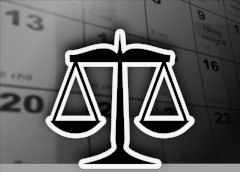LICADHO Report Details Stories from the Frontline of Cambodia's Fight for Freedom of Expression
Published on 20 December 2010Cambodia took a step backwards on freedom of expression issues in 2010, and is poised to continue the trend in 2011, according to a new report from LICADHO.
The report, "Freedom of Expression in Cambodia: The Illusion of Democracy" documents nearly 50 cases in which the government violated individuals' expressive freedoms during 2010. The incidents, taken together, illustrate a disturbing trend: Authorities are growing increasingly bold in their campaign to silence those who speak out against the political and economic elite. As a result, Cambodians are being excluded from participating in their own democracy.
"Democracy, by definition, requires citizen participation," said Dr. Pung Chhiv Kek, President of LICADHO. "When people are no longer able to freely speak, criticize and demonstrate their concerns, they are no longer participating. At that point, democracy becomes an illusion."
The case studies in the report were drawn from the period of April 1 to September 30, 2010, and were collected primarily from Khmer- and English-language media. There was nothing particularly exceptional about the six-month period - no elections, armed conflicts or national emergencies. Rather, LICADHO focused on a random, brief period to illustrate the magnitude of the challenges facing Cambodians who wish to exercise their expressive freedoms.
The range of targets was impressive: The report details attacks on the expressive rights of union leaders, community representatives, politicians, diplomats, NGO staff, monks, UN personnel and countless ordinary Cambodians. The tactics utilized by authorities included beatings, threats, interference with peaceful protest, and a dazzling array of abuses involving misuse of the judicial system.
In Battambang, a community representative was murdered after he spoke out against a land dispute involving the military. In Svay Rieng, a man was beaten after he was caught listening to independent radio stations. In Phnom Penh, a journalist-author received death threats after publishing a book criticizing government corruption. And in Kampong Cham, police attempted to prevent people from leaving their village to attend a protest in the capital.
"What is striking about these stories is their diversity and scope - they range from creative to crude, and involve people from all walks of life," said Naly Pilorge, Director of LICADHO. "The authorities have become quite imaginative in their drive to suppress dissent, and no one is immune from attack."
The report also features an analysis of nine new penal code provisions which pose a threat to Cambodians' expressive rights in 2011 and beyond. The penal code was enacted in 2009, but the substantive portions of the new penal code did not come into effect until Dec. 10, 2010. The code includes new provisions which, among other things, appear to criminalize all criticism of the judiciary.
The new code also contains a restrictive and broadly worded "incitement" provision (Article 495) which is very similar to the former code's crime of "disinformation." That provision was used for the first time on Dec. 19, when a convicted World Food Program employee Seng Kunnaka of incitement for allegedly printing out and distributing material from KI-Media, a Cambodian news blog that is known to take a strong stance against the government. He was sentenced to six month imprisonment and must pay a fine in the amount of 1,000,000 Riels.
LICADHO's statutory analysis was released previously, on Dec. 10, to mark the new code's effective date.
Finally, a separate section of the report reviews the arrests of journalists - and pseudo-journalists - during the government's illegal logging crackdown in early 2010. During the first part of the year, over a dozen journalists were arrested by authorities for attempting to extort money from individuals they suspected of illegal logging.
A number of the cases were confirmed to involve actual extortion, and thus did not necessarily implicate freedom of expression issues. However, the timing of the spate of arrests - during the government's carefully orchestrated illegal logging crackdown - highlighted an interesting paradox: Despite repeated claims of the crackdown's "success," the media reported the arrest of far more journalists than illegal loggers. This section of the report explores possible links between the illegal logging crackdown and the extortion arrests.
See additional web site highlights at http://licadho-cambodia.org/freedomofexpression2010
For more information, please contact:
▪ Mr. Am Sam Ath, LICADHO Technical Supervisor, 012 327 770
▪ Ms. Pilorge Naly, LICADHO Director, 012 803 650
PDF: Download full statement in English - Download full statement in Khmer






